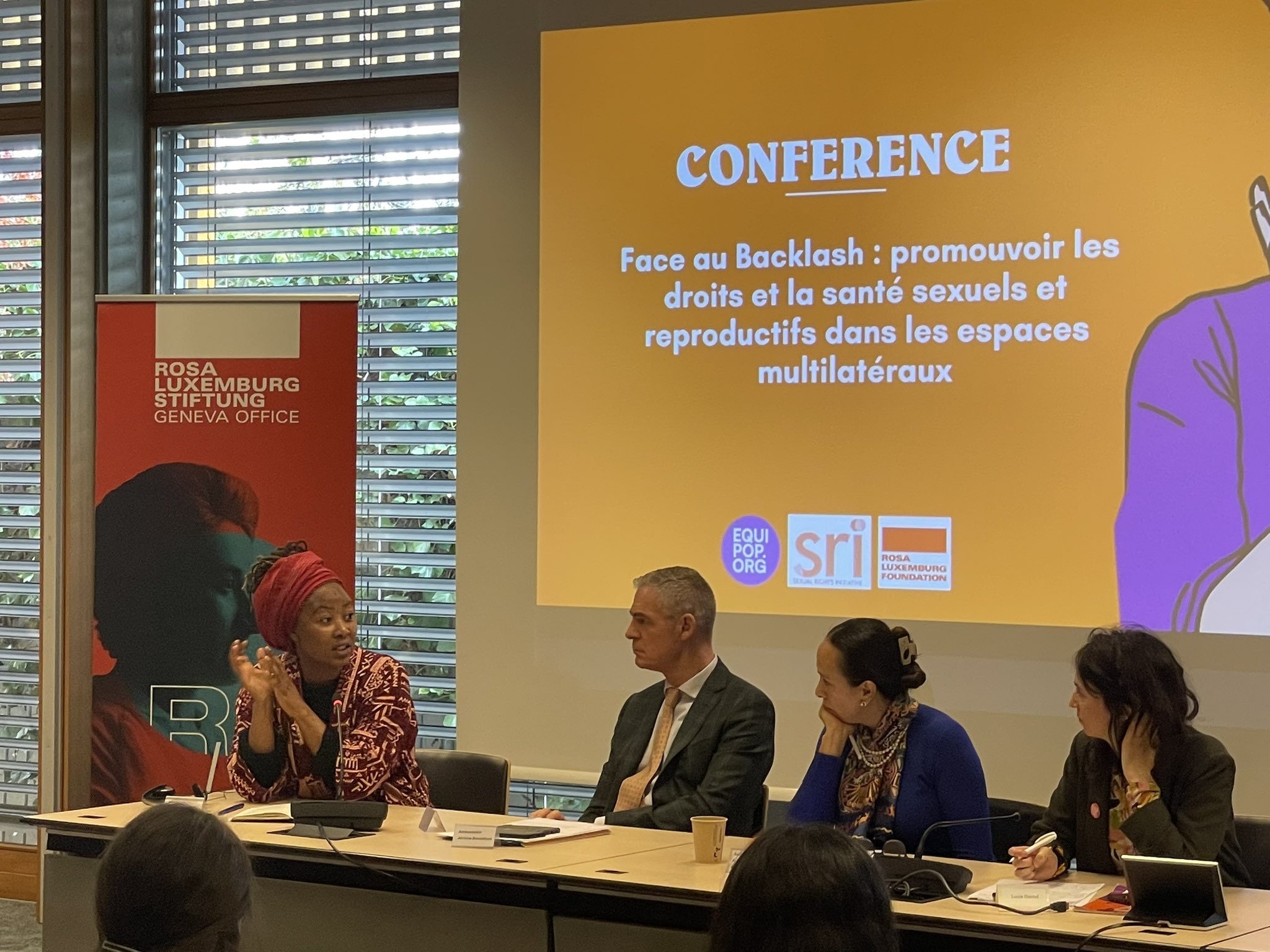
– Geneva Conference: strengthening alliances for a global feminist agenda in the face of backlash
On Tuesday November 21, 2023, Equipop organized a conference in Geneva on the theme “Promoting SRHR in multilateral spaces in the face of backlash” in collaboration with the Rosa Luxembourg Stiftung and Sexual Rights Initiative. The event gathered some 100 participants, both online and on site, demonstrating a strong interest in this issue. Discussions between panelists from a wide range of backgrounds outlined potential courses of action, notably through the creation of multi-stakeholder alliances to counter backlash in all its forms and in all multilateral forums.
In the context of the 75th anniversary of the Universal Declaration of Human Rights, Equipop, the Rosa Luxembourg stiftung (Geneva office) and SRI organized a conference in Geneva. The purpose was to analyze the dynamics of backlash against human rights around the world, and to strengthen alliances and collective strategies in the face of this phenomenon. The conference was also part of the Countdown 2030 Europe #AWorldWhere campaign.
The location of the conference, Geneva, was particularly strategic: the Palais des Nations and the Human Rights Council are places where the international community advances human rights standards. But Geneva is also a major rallying point for anti-rights movements. It was there, in 2020, that the “Geneva Consensus Declaration” was adopted*, marking a major milestone in the anti-rights offensive. Another such event, positioned against abortion rights and the rights of LGBTQIA+ people, held this time at the UN in New York a few days before the conference, confirmed the urgency of collective action.
The backlash against sexual and reproductive health and rights: the control of bodies and sexualities
Clara Dereudre, Equipop’s Advocacy Officer, presented the report published this year with the Fondation Jean-Jaurès on the “backlash” against women’s rights. This term refers to “the reactions of conservatives, or anti-rights movements, against advances in women’s rights, and more broadly in human rights. It also describes the strategy deployed by these conservative movements and the tools they mobilize to threaten, attack and flout these rights.”
Historically, the main objective of these anti-rights movements has been the control of bodies and sexualities. In addition to the abortion issue, these movements deny the rights of anyone who doesn’t fit the heteronormative, cisgender model. Their attacks take a variety of forms, in a continuum of sexual and institutional violence: systematic relegation of women’s bodies to their reproductive function, denial of the identity of trans people, criminalization of the sexuality of homosexuals. From this anti-DSSR crusade, anti-rights movements have expanded their agenda to attack other fundamental human rights. Thus, there is a convergence of anti-gender, anti-rights, anti-democratic and climate-skeptic agendas.
The interdependence of rights and systems of oppression
Against this observation, speakers at the conference highlighted the interdependence of systems of oppression. Vuyiseka Dubula, Director of the Communities, Rights and Gender Department at the Global Fund to Fight AIDS, Tuberculosis and Malaria, pointed out that the communities most affected by anti-rights movements are also the most affected by climate change, despite their lesser contribution to the crisis. This is particularly the case in the Sahel, where backlash is coupled with a security and climate crisis. Wendyam Micheline Kabore, executive director IPBF, pointed out that 75% of displaced populations are girls and women. At the same time, she stressed the urgent need to provide more support for activists, many of whom have been assaulted as a result of their commitment.
To fight these conservative movements, it is necessary to organize and defend human rights consistently, taking into account their indivisible nature. This is all the more important for those states claiming a feminist foreign policy. This is the case for France, Mexico and Spain, represented at the conference by their respective embassies. Ambassador Jérôme Bonnafont, Permanent Representative of France to the United Nations Office at Geneva and to international organizations in Switzerland, stressed that rights cannot be fulfilled through segmented approaches: “economic, social and cultural rights and civil and political rights are indivisible”. Estelle Wagner, International Advocacy expert, IPPF Geneva, emphasized that SRHR and economic and social rights are interconnected. Francisca E Méndez Escobar, Ambassador, Permanent Representative of Mexico to the United Nations Office at Geneva and to international organizations in Switzerland, insisted on the importance of feminist foreign policy being infused at all levels, in all diplomatic missions and in all multilateral agencies.
Anthea Taderera, Advocacy expert for SRI, highlighted the need for a coherent approach: “a state can consider itself a champion of SRHR and still be regularly criticized for failing to uphold rights related to economic justice, freedom from racism, freedom of movement and the right to development.”
Strengthening alliances and increasing funding for feminist movements
Tackling “backlash” requires building strong collaborations across borders between actors from different sectors. The central role of UN agencies on this issue was underlined by Aurora Díaz-Rato Revuelta, Ambassador and Permanent Representative of Spain to the United Nations Office at Geneva. Panelists highlighted the strategies of anti-rights movements to break down feminist solidarities, in a context where struggles are already fragmented by a competitive funding model and siloed political and budgetary approaches.
This crucial question of funding was raised by several speakers. Damjan Denkovski, Deputy Executive Director of the Center for Feminist Foreign Policy, pointed up the substantial financial resources available to anti-rights movements, enabling them to exert influence in multilateral forums. Citing a report by the European Parliamentary Forum on Sexual and Reproductive Rights, he noted that funding for anti-gender movements in Europe had quadrupled between 2009 and 2018.
This increasing trend should be seen in the context of the situation of feminist associations and movements, which suffer from a chronic lack of funding. On this subject, Sharlen Sezestre, of the Black Feminist Fund Board, warned of the even more glaring lack of access to funding for black feminist organizations. According to a report by the Black Feminist Fund, 59% of these organizations have never received core funding. She called for a culture of trust in feminist associations and more flexible ways of granting funding, both public and private.
Vuyiseka Dubula stressed the importance of investing in sexual and reproductive health and rights: “When it comes to SRHR, if we don’t move forward, we’ll go backwards. Right now, we’re standing still and we’re going to fall because we can’t afford to stand still. If we don’t invest enough, all the investment risks being wasted.” A call to action addressed to States and donors.
A mobilization to be sustained over the long term
Bringing together governments, multilateral bodies and civil society organizations, this conference is intended as a step in a longer-term process of mobilization. The presence of three embassies is a positive signal, and it will be important to consolidate this momentum and extend it to other countries. Equipop will continue to contribute to this mobilization by strengthening its alliances with stakeholders in the Geneva ecosystem.
* On October 22, 2020, 35 United Nations states signed the Geneva Consensus Declaration, in which they reaffirmed, among other things, their opposition to the right to abortion. To find out more, read the Equipop/ Fondation Jean Jaures report.


